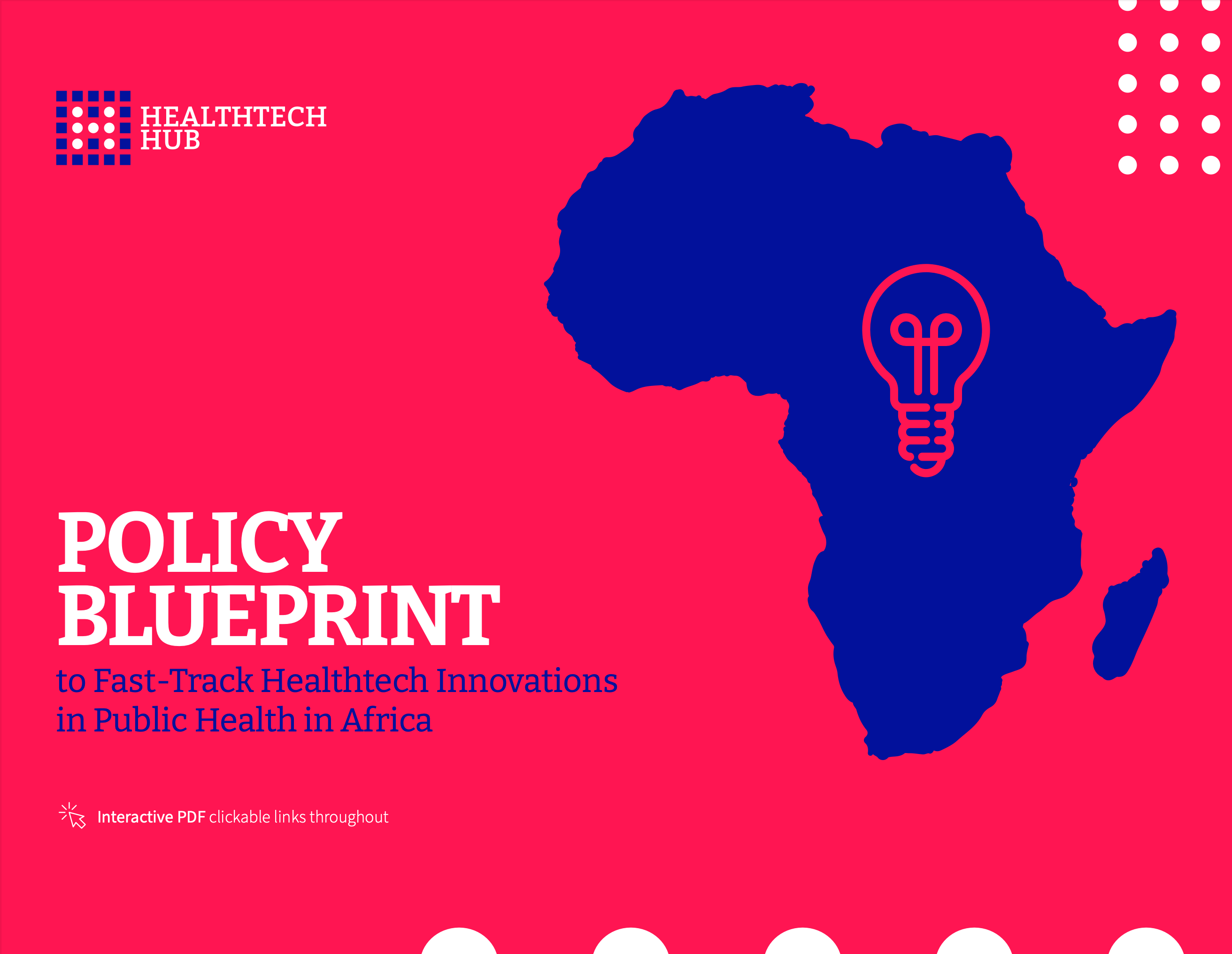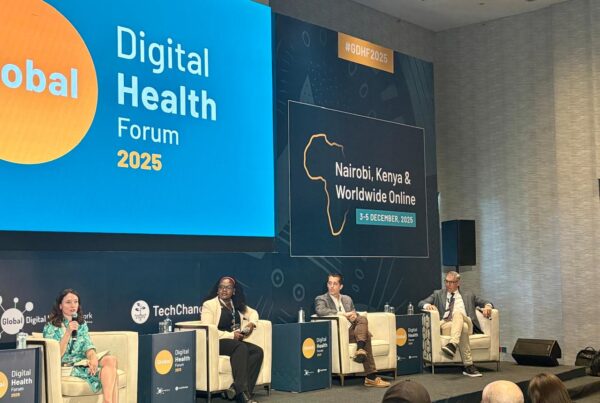Policy Blueprint: Summary
To Fast-Track Healthtech Innovations in Public Health in Africa
The Blueprint aims to support decision-makers by providing overall policy directions, specific actions and practical examples to complement their efforts to accelerate healthtech in Africa and enable innovation development, testing and sustainability.
Between May 2023 and February 2024, VillageReach, on behalf of the HealthTech Hub Africa (HTHA) and in collaboration with other partners, conducted various activities to collect data, gain insights and document experiences from innovators, government representatives and other stakeholders on using healthtech in selected African countries.
Data collection methods included a landscape analysis, interviews with 43 key informants, and face-to-face consultations with stakeholder groups from Côte d’Ivoire, Ethiopia, Kenya, Malawi, Nigeria, Rwanda, Senegal, South Africa, Tanzania, Uganda and Cameroon. Stakeholders consulted included healthtech innovators or startups, academics, investors, policymakers, civil society representatives and government officials.
The Blueprint encapsulates a comprehensive overview of the challenges, opportunities, recommendations, enablers, and practical examples identified during the extensive consultations and analyses.
- Background
Healthtech holds tremendous potential for patients, healthcare providers, health systems, and African communities. It offers a promising path towards achieving Universal Health Coverage and health-related Sustainable Development Goals.
Healthtech can help mitigate challenges in the health system, such as the shortage of healthcare professionals and poor logistics and supply systems.
A study found that using electronic medical records and virtual interactions such as telemedicine can generate up to 15% efficiency gains and free up resources to address other patient needs.
African governments have demonstrated their recognition of the value of healthtech. Some have made significant strides in leveraging innovations to enhance their health systems and healthcare delivery.
A 2023 mapping by IQVIA shows that most African countries have well-established national digital health strategies and have allocated human resources and established dedicated teams to identify, evaluate and implement effective healthtech solutions.
Multilateral partners are making significant contributions to advancing healthtech in Africa. They are developing frameworks, providing technical assistance, and offering financial resources. Notable examples include the World Health Organization, Africa CDC, African Development Bank, World Bank, and the World Economic Forum.
Acknowledging this broad foundation of existing efforts, the HTHA expanded the healthtech knowledge base, leveraging the large set of startups participating in its accelerator program and its existing relationships with many African governments and stakeholders.
- Challenges in Accelerating Healthtech in Africa
Lack of unified, comprehensive and updated set of policies governing healthtech at country and regional levels
One of the obstacles to implementing and scaling up healthtech in Africa, most frequently cited by stakeholders, is the lack of policies or frameworks that comprehensively address all aspects of the subject.
This includes health data privacy and security policies, data sharing, data interoperability and licensing procedures for healthtech products.
In countries where healthtech policies exist, they often need to be clarified, complete, consistent and open to misinterpretation or are not implemented or enforced accordingly.
Complex, lengthy and unclear healthtech licensing processes
Stakeholders identified the cumbersome, unclear and protracted licensing process as a barrier to the introduction of healthtech in Africa.
Most of the innovators interviewed echoed that the licensing processes in their countries are inefficient, lack clear and concise criteria, are poorly communicated and inconsistent, are not coordinated across regulators and hinder innovation.
Poor infrastructure to support healthtech
Poor infrastructure, including unreliable electricity supply and limited internet connectivity, hinders the introduction, adoption, scaling, and sustainability of healthtech in most African countries.
The situation is terrible in rural and some urban areas where internet services are not available, or connections are sub-optimal because of challenges with limited bandwidth, network instability, erratic electricity supply, slow speed, and high data costs.
Limited access to healthcare data
While progress has been made in digitizing health data across low—and middle-income countries, health data collection tools are not yet entirely digitized in many settings, patient data are still stored on paper registers and patient cards, and data collection and handling systems are fragmented.
In some cases, policies and processes regarding innovators’ access to health data from government institutions need to be clarified. Countries also need policies that allow innovators to collect patient data directly.
Policies and regulations on ownership of health data need to be more consistent within and between countries, impacting resource allocation, coordination and accountability. Such situations limit access to healthtech data and information required for innovations.
Data insecurity
Although data sharing has benefits, there is a risk of system security breaches through malware attacks or hacking and sale to third parties for use outside of the original plan for which healthtech users gave consent.
Health data are susceptible and open to misuse or abuse during storage or when shared with third parties.
Therefore, maintaining data security while providing access to innovators and other private sector stakeholders is challenging.
Lack of protection for healthtech intellectual property rights
Regulations and laws regarding healthtech innovations and intellectual property vary from country to country in Africa, and the legal proceedings need to be clarified.
Weak protection and enforcement of intellectual property rights and fear of copyright infringement in some countries have discouraged innovators and researchers from investing in healthtech or openly engaging with governments regarding their innovations.
Limited integration of healthtech into health systems
Most healthtech innovations are created to provide solutions for specific disease programs, organizations or health facilities. Digital systems sometimes vary across departments within the same facility.
African countries that have invested in health data collection and storage have yet to invest commensurately in functioning interoperability frameworks that support integration into health information systems.
This lack of integration seriously challenges data aggregation, integrity, interoperability, digitization and standardization. It also negatively impacts the efficient use of health data and the sustainability of healthtech solutions.
Limited operational capacity for healthtech
Technical capacity in the public sector to manage healthtech needs to be improved in most African countries.
Respondents noted that health systems, public health authorities, and health workers need to be more adequately empowered to maintain and operate digital technology and keep up with the latest developments in health technology.
Poor coordination, partnerships and collaborations
The lack of coordination, coupled with limited cooperation and partnerships among multisectoral teams of experts involved in healthtech, is a barrier to developing a shared understanding of the goals of healthtech, the development of comprehensive context-specific guidelines and effective development and deployment of innovative health technologies.
Insufficient funding for healthtech
Healthtech is among the least prioritized in health systems funding in Africa. Governments rely heavily on donor funding for healthtech solutions and do not provide incentives for healthtech.
Therefore, innovators do not see the public health sector as a viable healthtech market and need help securing the much-needed capital to develop, implement and sustain their solutions.
The HTHA plans to build upon the initial work of the Blueprint by convening governments and partners to validate and refine the recommendations and supporting the identification and implementation of specific actions to accelerate healthtech innovations tailored to each country’s specific situation, needs and priorities.












